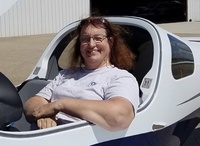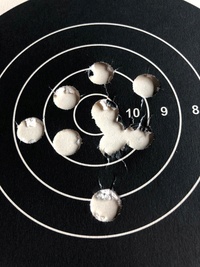Ballistics Primer (see what I did there?)
4 posters
Page 1 of 1
 Ballistics Primer (see what I did there?)
Ballistics Primer (see what I did there?)
I am not trying to teach anything here, I’m trying to learn.
The following are things I think I know. True or False?:
In this conversation, we’re not building a gun and, since changing twist rates is not that easy, let’s put that aside. The safe range of power charges for a particular bullet is published and the range of COL and crimp is pretty well established.
If, theoretically, I test a bullet to find its optimum muzzle velocity for accuracy, how do I find the optimal load? If I need to change my load to approach said optimal velocity, how do I decide which variable to change?
e.g., say I want to speed up my load. Do I increase the powder? Increase the crimp (lower number)? Shorten the length?
For the sake of conversation, let’s assume we always stay within safety limits and that any variable change that affects reliable function is eliminated unless it can be fixed by a simple spring change.
One last request: Try to keep your comments on the simple side. I’m not looking to be an expert on power factors and physics. Just trying to get a practical understanding.
Thanks
The following are things I think I know. True or False?:
- Each projectile has an optimum muzzle velocity for accuracy (I believe I read that)
- Twist rate of barrel affects accuracy
- Powder charge affects muzzle velocity
- Crimp affects muzzle velocity
- COL (volume) affects muzzle velocity
In this conversation, we’re not building a gun and, since changing twist rates is not that easy, let’s put that aside. The safe range of power charges for a particular bullet is published and the range of COL and crimp is pretty well established.
If, theoretically, I test a bullet to find its optimum muzzle velocity for accuracy, how do I find the optimal load? If I need to change my load to approach said optimal velocity, how do I decide which variable to change?
e.g., say I want to speed up my load. Do I increase the powder? Increase the crimp (lower number)? Shorten the length?
For the sake of conversation, let’s assume we always stay within safety limits and that any variable change that affects reliable function is eliminated unless it can be fixed by a simple spring change.
One last request: Try to keep your comments on the simple side. I’m not looking to be an expert on power factors and physics. Just trying to get a practical understanding.
Thanks
mspingeld- Admin
- Posts : 835
Join date : 2014-04-19
Age : 64
Location : New Jersey
 Re: Ballistics Primer (see what I did there?)
Re: Ballistics Primer (see what I did there?)
For pistol loads, in particular bullseye loads.
False to some extent, there can be more than one node.
True to some extent, depends on bullet weight vs twist.
True and group size
True and SD of the velocities as well
True and group size
No doubt many others will give you their personal preferences. I'd suggest you just start with some of the loads listed in the stickies above.
CR
False to some extent, there can be more than one node.
True to some extent, depends on bullet weight vs twist.
True and group size
True and SD of the velocities as well
True and group size
No doubt many others will give you their personal preferences. I'd suggest you just start with some of the loads listed in the stickies above.
CR
CR10X- Posts : 1777
Join date : 2011-06-17
Location : NC
 Re: Ballistics Primer (see what I did there?)
Re: Ballistics Primer (see what I did there?)
Here are a couple of spreadsheets showing SD of various loads in 45 and 38. SD is variable depending on Powder charge and burn characteristics. 
 Note that any SD below 12 is a good number, probably great! That said it wasn’t necessarily the best shooting load. As for nodes in pistol shooting, I’m not sure I’d call them nodes. Barrel harmonics are a very black art and how a pistol barrel behaves is even moreso. You have a somewhat limited window of loads due to pressure and function so you find a decent load and stick with it. Crimp has an effect on ignition primarily but has a limit.
Note that any SD below 12 is a good number, probably great! That said it wasn’t necessarily the best shooting load. As for nodes in pistol shooting, I’m not sure I’d call them nodes. Barrel harmonics are a very black art and how a pistol barrel behaves is even moreso. You have a somewhat limited window of loads due to pressure and function so you find a decent load and stick with it. Crimp has an effect on ignition primarily but has a limit.

 Note that any SD below 12 is a good number, probably great! That said it wasn’t necessarily the best shooting load. As for nodes in pistol shooting, I’m not sure I’d call them nodes. Barrel harmonics are a very black art and how a pistol barrel behaves is even moreso. You have a somewhat limited window of loads due to pressure and function so you find a decent load and stick with it. Crimp has an effect on ignition primarily but has a limit.
Note that any SD below 12 is a good number, probably great! That said it wasn’t necessarily the best shooting load. As for nodes in pistol shooting, I’m not sure I’d call them nodes. Barrel harmonics are a very black art and how a pistol barrel behaves is even moreso. You have a somewhat limited window of loads due to pressure and function so you find a decent load and stick with it. Crimp has an effect on ignition primarily but has a limit.
Wobbley- Admin
- Posts : 4805
Join date : 2015-02-12
 Re: Ballistics Primer (see what I did there?)
Re: Ballistics Primer (see what I did there?)
Well, "node" was the best word I had. Using incremental load development, I've had more than one occurrence where there would be distinctive grouping at two or more power charges. The nosler 185 just seems to stay or tighter right up to the max with a lot of powders though. We can wind up chasing a lot if "what if's" when reloading, especially pistol.
I just settled on a good lead and good JHP load and just work on shooting until the next barrel replacement. Then a little tweak is usually all thats needed.
CR
I just settled on a good lead and good JHP load and just work on shooting until the next barrel replacement. Then a little tweak is usually all thats needed.
CR
CR10X- Posts : 1777
Join date : 2011-06-17
Location : NC
 Re: Ballistics Primer (see what I did there?)
Re: Ballistics Primer (see what I did there?)
Interesting! I too have 2 loads that work well for me. 185 jhp, 4.5 grains of N310, 1.205 OAL, .469 crimp for the long line. And a nice, soft shooting, 3.9 N310 with the Zero 185 swaged hollow point for the short line.
Not really looking to change at this point. Just looking to better understand the concepts.
The "node" idea is new for me. I didn't realize that a projectile could have more than one "sweet spot".
SD! Great! Another variable
Not really looking to change at this point. Just looking to better understand the concepts.
The "node" idea is new for me. I didn't realize that a projectile could have more than one "sweet spot".
SD! Great! Another variable
mspingeld- Admin
- Posts : 835
Join date : 2014-04-19
Age : 64
Location : New Jersey
 Re: Ballistics Primer (see what I did there?)
Re: Ballistics Primer (see what I did there?)
It seems for a 200 grain SWC, Just over 700 fps is a good spot to hit.
For a 185 SWC OR JHP 775 fps seems to be the spot.
With a decent gun, most any load will shoot good groups.
Crimp seems to have more to do with consistency than accuracy if that makes sense.
I don't think SD has much to do with accuracy unless its really wild. We are only shooting 50 yards.
Have fun, you can get lost in looking for that magic load when its really up to you more than the load.
Practice or training time is where its at.
I read the entire reloading section. What I read is reflected above.
The photo to the right explains it well. All 10 could have gone in the center. Instead, I threw 4 of them out. Its me, not the ammo. If I am pointing the gun at the 7 ring, I am sure to get a 7. That is a 25 yard slow fire target.
David
For a 185 SWC OR JHP 775 fps seems to be the spot.
With a decent gun, most any load will shoot good groups.
Crimp seems to have more to do with consistency than accuracy if that makes sense.
I don't think SD has much to do with accuracy unless its really wild. We are only shooting 50 yards.
Have fun, you can get lost in looking for that magic load when its really up to you more than the load.
Practice or training time is where its at.
I read the entire reloading section. What I read is reflected above.
The photo to the right explains it well. All 10 could have gone in the center. Instead, I threw 4 of them out. Its me, not the ammo. If I am pointing the gun at the 7 ring, I am sure to get a 7. That is a 25 yard slow fire target.
David

David R- Posts : 408
Join date : 2018-12-10
Age : 64
Location : Hamlin NY
 Similar topics
Similar topics» Small Primer vs Large Primer 45 ACP Benchmark
» Odd CCI primer
» Backward Primer
» Purely Ballistics - What does it take for a .45 to be accurate @50yds
» Primer Hardness
» Odd CCI primer
» Backward Primer
» Purely Ballistics - What does it take for a .45 to be accurate @50yds
» Primer Hardness
Page 1 of 1
Permissions in this forum:
You cannot reply to topics in this forum